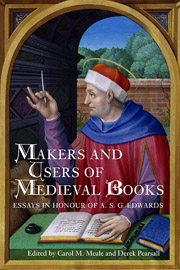Book contents
- Frontmatter
- Contents
- List of Illustrations
- Contributors
- Preface
- List of Abbreviations
- COMPOSITION
- COMPILATION
- PRODUCTION
- OWNERS, PATRONS, READERS
- Trinity College MS 516:A Clerical Historian's Personal Miscellany
- Katherine de la Pole and East Anglian Manuscript Production in the Fifteenth Century: An Unrecognized Patron?
- Past Ownership: Evidence of Book Ownership by English Merchants in the Later Middle Ages
- Early Printed Continental Books Owned in England: Some Examples in the Takamiya Collection
- AFTERLIVES
- A. S. G. Edwards: List of Publications
- Index of Manuscripts and Early Printed Books
- General Index
- Tabula Gratulatoria
Past Ownership: Evidence of Book Ownership by English Merchants in the Later Middle Ages
from OWNERS, PATRONS, READERS
Published online by Cambridge University Press: 05 May 2014
- Frontmatter
- Contents
- List of Illustrations
- Contributors
- Preface
- List of Abbreviations
- COMPOSITION
- COMPILATION
- PRODUCTION
- OWNERS, PATRONS, READERS
- Trinity College MS 516:A Clerical Historian's Personal Miscellany
- Katherine de la Pole and East Anglian Manuscript Production in the Fifteenth Century: An Unrecognized Patron?
- Past Ownership: Evidence of Book Ownership by English Merchants in the Later Middle Ages
- Early Printed Continental Books Owned in England: Some Examples in the Takamiya Collection
- AFTERLIVES
- A. S. G. Edwards: List of Publications
- Index of Manuscripts and Early Printed Books
- General Index
- Tabula Gratulatoria
Summary
An important aspect of the past of a medieval book is its former ownership, a fact long recognized and researched. Records of ownership occur in library catalogues, documenting the usually random ownership of any and all manuscripts in the collection, and the Corpus of British Medieval Library Catalogues has added immensely to our knowledge not only of books available in religious houses, but of private donors to the houses as well. Scholarly studies often concentrate on the libraries of a single collector, with considerable past interest having been shown in collections by members of high social status, by royalty, the nobility, and armigerous owners. Occasionally, studies are made of a town and its immediate area or of a larger district. Recording of medieval English owners of books according to their occupation or profession is less common, and Carol Meale and Anne Sutton have been exceptional in discussing book ownership in these terms, in particular the mercantile estate. My intention here is to be even more reductive concerning this aspect of ownership and simply to compile names of merchants and craftsmen for whom there is reasonably firm evidence of ownership of a book or books. In List I below the evidence derives from inscriptions in manuscripts and early printed books that state ownership (e.g. ‘constat’) or strongly imply ownership. List II is compiled from sources such as wills, inventories of goods, and, more rarely, the presence of an indenture in a book. In addition to the evidence here, we must be impressed by Sylvia Thrupp's statements that ‘the merchants’ own demand for books was one of the chief factors conditioning [the] supply’ and that merchants had ‘long formed an important proportion of the country's small lay book-owning public’.
- Type
- Chapter
- Information
- Makers and Users of Medieval BooksEssays in Honour of A.S.G. Edwards, pp. 150 - 177Publisher: Boydell & BrewerPrint publication year: 2014



